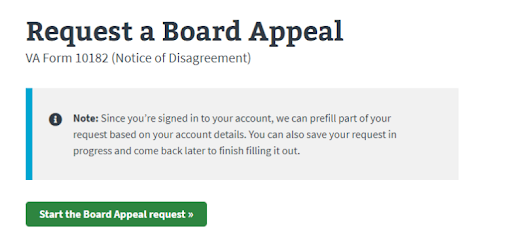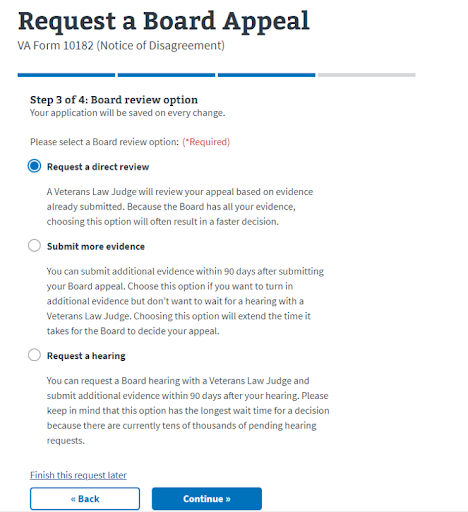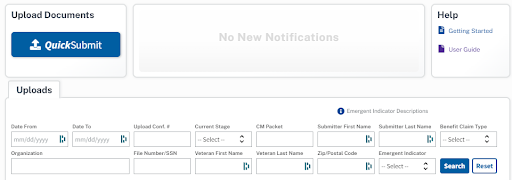Looking for Expert-Level VA Claim Answers?📱Call Us Now! 737-295-2226
Veterans Can Now Appeal a VA Claim Online!
Veterans, has your VA claim been denied recently? Did you know that you can now file a VA claim appeal online? The VA Board of Appeals has created a new online process that makes it simple for veterans to get their appeals heard by the board.
In February 2019, the VA modernized the appeals process under the Appeals Modernization Act, streamlining the process.
Now, there are three distinct ways to appeal a VA claim decision. The new process enables you to appeal your claim directly to the VA Board of Appeals!
Although other appeal options include a higher-level review or a supplemental claim under the Appeals Modernization Act of 2019, this article focuses on the third option—appealing directly to the Board of Veterans’ Appeals.
If you aren’t happy with a VA decision, you have the right to appeal it. If you choose a board review appeal, the Board of Veterans’ Appeals will review all the evidence and make a decision.

- Veterans Can Now Appeal a VA Claim Online!
- What is the Board of Veterans’ Appeals?
- What three types of appeals can you make to the VA Board of Appeals?
- How to File a BVA Appeal Online
- What to Expect at a VA Board of Appeals Hearing
- How long does it take for a BVA decision?
- What decisions can come from a Board of Veterans’ Appeals?
- Where can I find the Board of Veterans’ Appeals decision?
- What percentage of VA appeals are successful?
- What if the VA Board of Appeals denies my claim?
- NEED MORE ASSISTANCE?
- About the Author
Deserve a Higher VA Rating?
Book a no-obligation VA Claim Discovery Call with an experienced team member. We’ll review your situation, spot what the VA may have missed, and help you map out a strategy to unlock the VA disability rating and tax-free compensation you’ve earned for your service. Click the red button below to book your call.
What is the Board of Veterans’ Appeals?
The Board of Veterans’ Appeals (BVA) is an independent organization within the VA that reviews decisions made about claims for benefits. The BVA has the power to overturn decisions made by your regional VA office about your disability claim.
The board consists of many different Veterans Law Judges, led by a Chairman and Vice-Chairman. Many people on the administrative staff help the judges review claims.
What happens at the VA Board of Appeals?
The BVA reviews claims by looking at the claim and all the evidence and issuing a final decision. The board handles all VA benefits, including home loans, health care, and education. However, most of the appeals they look at are VA disability appeals. The board has the power to overturn regional VA office decisions.
You can choose from three different board appeal options.
What three types of appeals can you make to the VA Board of Appeals?
The three types of different board appeals, or dockets, you can make directly to the board are:
- Request a direct review (direct docket)
- Submit more evidence (evidence docket)
- Request a hearing (hearing docket)
Direct Review
The VA Board of Appeals will take a fresh look at your claim and all the evidence to make a new decision. The board will only look at the evidence already in your file to review your claim and make a decision. You don’t have the option to submit more evidence.
Submit More Evidence
If you have new evidence that wasn’t previously submitted or considered, you can submit it directly to the board for review. New evidence could be things like:
- Medical records (in-service, VA, and private)
- Medical opinions
- Military service records
- C&P examinations
- Lay statements (or buddy statements)
The main benefit of this option is that you can submit more evidence, but the waiting time for a decision is generally much less than requesting a hearing.
Note you only have 90 days to physically submit the evidence once you file this type of appeal.
Request a Hearing
You can request an in-person hearing or a video conference. This is an opportunity to present your case to a Veterans Law Judge. You can include additional evidence that supports your claim during the hearing. You can also have a representative there on your behalf to help you.
This could be a VA-accredited lawyer, a claims agent, or someone from a Veterans Service Organization.
You can include relevant witnesses to support your claim. You’ll also be able to submit new evidence up to 90 days after the hearing.
There are now three options for your hearing:
- Virtual from your home
- Videoconference at a local VA office
- In-person in Washington, DC
When your hearing is scheduled, you’ll get a letter with the details at least 30 days before the hearing. You’ll also receive an email. It’s important to make sure you’re there! If you can’t make it, you can reschedule up to two weeks before the hearing date.
There won’t be a video recording no matter which option you choose, but you can ask for a transcript of the hearing.
How to File a BVA Appeal Online
Here are the steps to filing a BVA appeal:
1. Choose which type of docket you want to file
After you’ve decided to file an appeal directly to the Board of Veterans’ Appeals, you must choose which of the three docket options to file. You can request a direct review, submit more evidence, or request a hearing.
2. File a Notice of Disagreement
When you choose to appeal directly to the Board of Veterans’ Appeals, you must file a Notice of Disagreement within one year from the date the VA sent you the original decision. You can use VA Form 10182 to file a Notice of Disagreement.
If you file a Notice of Disagreement, you have one year from the date the VA sends the decision to disagree.
You can easily file VA Form 10182 electronically by using the VA’s tool to request a board appeal. Make sure you’re logged into your VA.gov account.

Once you begin the application, you’ll complete the appeal request in four steps.
Step 1 – Complete basic personal information
Step 2 – Select which claim you want to appeal and what part of the claim you wish to contest:
- Service connection
- Effective Date
- The VA’s evaluation of my condition
- Something else
Step 3 – Choose a board review option (direct review, submit more evidence, or request a hearing)

Step 4 – Review everything and submit your appeal request
3. Submit new evidence to the VA Board of Appeals (If applicable)
If you’ve selected an evidence docket or a hearing docket, you can submit new evidence.
The VA has just rolled out a new system in 2022 to make it easier for Veterans to submit evidence to the VBA Claims Intake Center. In the past, you had to mail or fax in evidence.
Now, you can easily upload documents online using the QuickSubmit application.

You can access QuickSubmit here.
What to Expect at a VA Board of Appeals Hearing
If you choose to appeal directly to the VA Board of Appeals and request a hearing, you can expect a hearing with a Veterans Law Judge. Hearing usually takes about 30 minutes.
The hearing is an opportunity for you to tell your story to the judge. You should tell the judge why you think the original VA decision should be overturned. You’ll submit new evidence and answer any questions the judge has about your appeal.
The judge may ask you questions, but it will not be like a cross-examination. Answer the questions forthrightly and be ready to present any new evidence you brought with you. This is the time when your representative, if you choose to have one, may help you.
The judge may offer advice on what you can do to help qualify for VA benefits. This may include additional VA medical exams or tests.
Don’t expect a decision at the end of your hearing. Instead, your case will be added to the board’s list of appeals to work on in the future.
How do I contact the VA Board of appeals?
The Board of Veterans’ Appeals is located in Washington D.C. The mailing address for the board is:
Board of Veterans’ Appeals
PO Box 27063
Washington, D.C. 20038
The Board of Veterans’ Appeals Phone Number is 1-800-827-1000.
How long does it take for a BVA decision?
Under the legacy appeals process, the average VA Board of Appeals decision took 5.5 years! Usually, under the new process, you’ll receive a decision much faster.
In 2022, the average wait time for a VA appeal ranges from 12-18 months, from the time you first file an appeal to when the VA issues a decision on your appeal.
The type of appeal you choose will greatly impact how long it takes the Board of Veterans’ Appeals to make a decision.
How long does a BVA direct review appeal take?
In 2022, a direct review appeal to the VA Board of Appeals takes the board about 11-12 months to come to a decision from when you first file an appeal.
How long does a BVA review take if you submit additional evidence?
In 2022, an appeal to the VA Board of Appeals in which you submit additional evidence takes the board about 12 months to come to a decision from when you first file an appeal.
How long does a board review hearing appeal take?
A hearing docket appeal typically takes the longest of all the VA Board of Appeal options. We’ve seen drastic changes in the amount of time a hearing takes to get scheduled based on the board’s caseload. In 2022, a hearing with the VA Board of Appeals takes about 18 months to receive a decision after filing your appeal.
Is there a way to get a faster decision from the BVA?
The Board of Veterans’ Appeals is required by law to review cases in the order they’re received unless there is unusual hardship involved.
You can submit a motion for advancement to move your appeal up the list if you meet any of these criteria: severe financial hardship, serious illness, advanced age (75 or more), an administrative error, or being affected by a natural disaster.
To file a motion for advancement, mail your motion to:
Board of Veterans’ Appeals
P.O. Box 27063
Washington, DC 20038

What decisions can come from a Board of Veterans’ Appeals?
You can get several different types of decisions from the BVA: granted, remand, or denied. You could also get several decisions based on how many issues you’re appealing.
- Granted – Your appeal has been successful. The board can assign you a rating decision and effective date that your regional office must honor. However, sometimes the board merely overturns the decision, and your regional office will issue a rating percentage and effective date.
- Remand – Your case has been sent back to the regional VA for further review with additional instructions to better explain your claim (often medical evidence-gathering). Remands are usually required if the law changes, if the condition on appeal worsens, or if the veteran presents new evidence (or a theory of entitlement) to the board.
- Denied – The BVA has decided not to overturn the VA’s original decision on your claim.
Where can I find the Board of Veterans’ Appeals decision?
After the BVA has decided on your appeal, you’ll receive a board decision letter. In the letter, the board will explain the details of your case and an explanation of the decision. It may also include rating criteria and case law that applies to your case. The end of the letter will discuss what actions you can take if you still disagree with the decision.
You don’t have to wait for a letter; the VA Board of Appeals posts all of its decisions online. You can find the status of your appeal here or by calling 1-800-827-1000.
The BVA has maintained a searchable database of all appeal cases since 1992. You can search the database here.
What percentage of VA appeals are successful?
According to the VA, in 2021, under the new VA appeals process, 38.1% of appeals were successful.
Since switching over to the new process, appeals are more often approved when compared to the legacy process—usually by about 5%.
If you decide to request a hearing, virtual hearings have been much more successful recently when compared to in-person or video conference hearings (about 15-20% more successful!).

What if the VA Board of Appeals denies my claim?
Don’t give up! You can still file an additional appeal with the Court of Appeals for Veterans Claims (CAVC). You can appeal to the CAVC within 120 days if your appeal at the VA Board of Appeals is denied.
If you’re a veteran and your disability claim was denied by the Board, don’t worry. Our team of experts can help you appeal the decision to get you the benefits you deserve.
NEED MORE ASSISTANCE?
Most veterans are underrated for their disabilities and therefore not getting the compensation they’re due. At VA Claims Insider, we help you understand and take control of the claims process, so you can get the rating and compensation you’re owed by law.
Our process takes the guesswork out of filing a VA disability claim and supports you every step of the way in building a fully-developed claim (FDC).
If you’ve filed your VA disability claim and have been denied or have received a low rating—or you’re unsure how to get started—reach out to us! Take advantage of a VA Claim Discovery Call. Learn what you’ve been missing—so you can FINALLY get the disability rating and compensation you deserve!
We’ve supported more than 25,000 veterans to win their claims and increase their ratings. NOW IT’S YOUR TURN.
About the Author

Brian Reese
Brian Reese is a world-renowned VA disability benefits expert and the #1 bestselling author of VA Claim Secrets and You Deserve It. Motivated by his own frustration with the VA claim process, Brian founded VA Claims Insider to help disabled veterans secure their VA disability compensation faster, regardless of their past struggles with the VA. Since 2013, he has positively impacted the lives of over 10 million military, veterans, and their families.
A former active-duty Air Force officer, Brian has extensive experience leading diverse teams in challenging international environments, including a combat tour in Afghanistan in 2011 supporting Operation ENDURING FREEDOM.
Brian is a Distinguished Graduate of Management from the United States Air Force Academy and earned his MBA from Oklahoma State University’s Spears School of Business, where he was a National Honor Scholar, ranking in the top 1% of his class.



